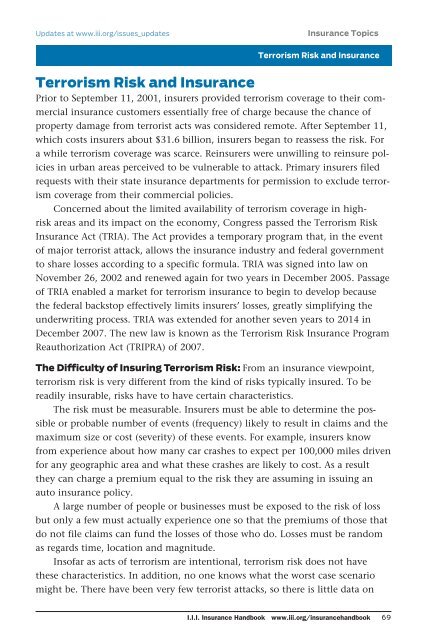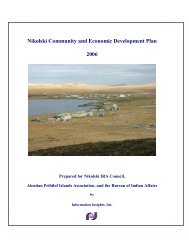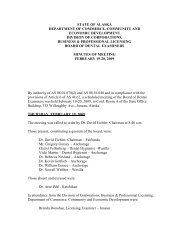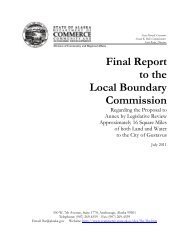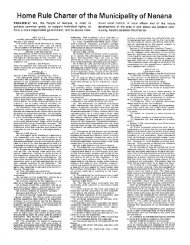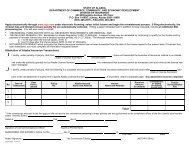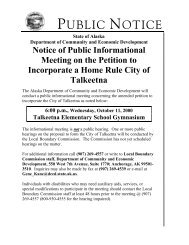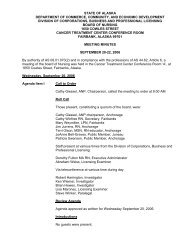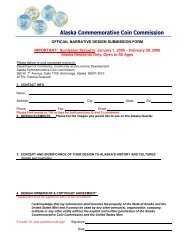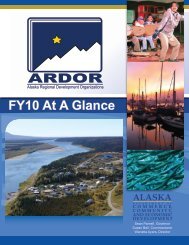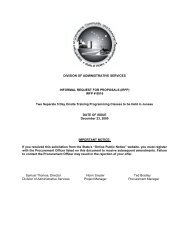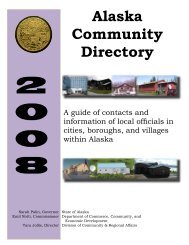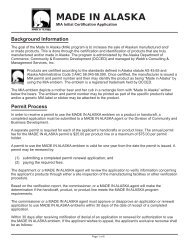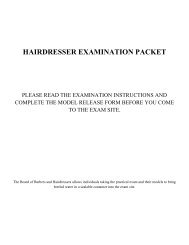Insurance Handbook - Alaska Department of Community and ...
Insurance Handbook - Alaska Department of Community and ...
Insurance Handbook - Alaska Department of Community and ...
You also want an ePaper? Increase the reach of your titles
YUMPU automatically turns print PDFs into web optimized ePapers that Google loves.
Updates at www.iii.org/issues_updates <strong>Insurance</strong> Topics<br />
Terrorism Risk Auto <strong>and</strong> <strong>Insurance</strong><br />
Terrorism Risk <strong>and</strong> <strong>Insurance</strong><br />
Prior to September 11, 2001, insurers provided terrorism coverage to their com-<br />
mercial insurance customers essentially free <strong>of</strong> charge because the chance <strong>of</strong><br />
property damage from terrorist acts was considered remote. After September 11,<br />
which costs insurers about $31.6 billion, insurers began to reassess the risk. For<br />
a while terrorism coverage was scarce. Reinsurers were unwilling to reinsure policies<br />
in urban areas perceived to be vulnerable to attack. Primary insurers filed<br />
requests with their state insurance departments for permission to exclude terrorism<br />
coverage from their commercial policies.<br />
Concerned about the limited availability <strong>of</strong> terrorism coverage in highrisk<br />
areas <strong>and</strong> its impact on the economy, Congress passed the Terrorism Risk<br />
<strong>Insurance</strong> Act (TRIA). The Act provides a temporary program that, in the event<br />
<strong>of</strong> major terrorist attack, allows the insurance industry <strong>and</strong> federal government<br />
to share losses according to a specific formula. TRIA was signed into law on<br />
November 26, 2002 <strong>and</strong> renewed again for two years in December 2005. Passage<br />
<strong>of</strong> TRIA enabled a market for terrorism insurance to begin to develop because<br />
the federal backstop effectively limits insurers’ losses, greatly simplifying the<br />
underwriting process. TRIA was extended for another seven years to 2014 in<br />
December 2007. The new law is known as the Terrorism Risk <strong>Insurance</strong> Program<br />
Reauthorization Act (TRIPRA) <strong>of</strong> 2007.<br />
The Difficulty <strong>of</strong> Insuring Terrorism Risk: From an insurance viewpoint,<br />
terrorism risk is very different from the kind <strong>of</strong> risks typically insured. To be<br />
readily insurable, risks have to have certain characteristics.<br />
The risk must be measurable. Insurers must be able to determine the possible<br />
or probable number <strong>of</strong> events (frequency) likely to result in claims <strong>and</strong> the<br />
maximum size or cost (severity) <strong>of</strong> these events. For example, insurers know<br />
from experience about how many car crashes to expect per 100,000 miles driven<br />
for any geographic area <strong>and</strong> what these crashes are likely to cost. As a result<br />
they can charge a premium equal to the risk they are assuming in issuing an<br />
auto insurance policy.<br />
A large number <strong>of</strong> people or businesses must be exposed to the risk <strong>of</strong> loss<br />
but only a few must actually experience one so that the premiums <strong>of</strong> those that<br />
do not file claims can fund the losses <strong>of</strong> those who do. Losses must be r<strong>and</strong>om<br />
as regards time, location <strong>and</strong> magnitude.<br />
Ins<strong>of</strong>ar as acts <strong>of</strong> terrorism are intentional, terrorism risk does not have<br />
these characteristics. In addition, no one knows what the worst case scenario<br />
might be. There have been very few terrorist attacks, so there is little data on<br />
I.I.I. <strong>Insurance</strong> <strong>H<strong>and</strong>book</strong> www.iii.org/insuranceh<strong>and</strong>book 69


